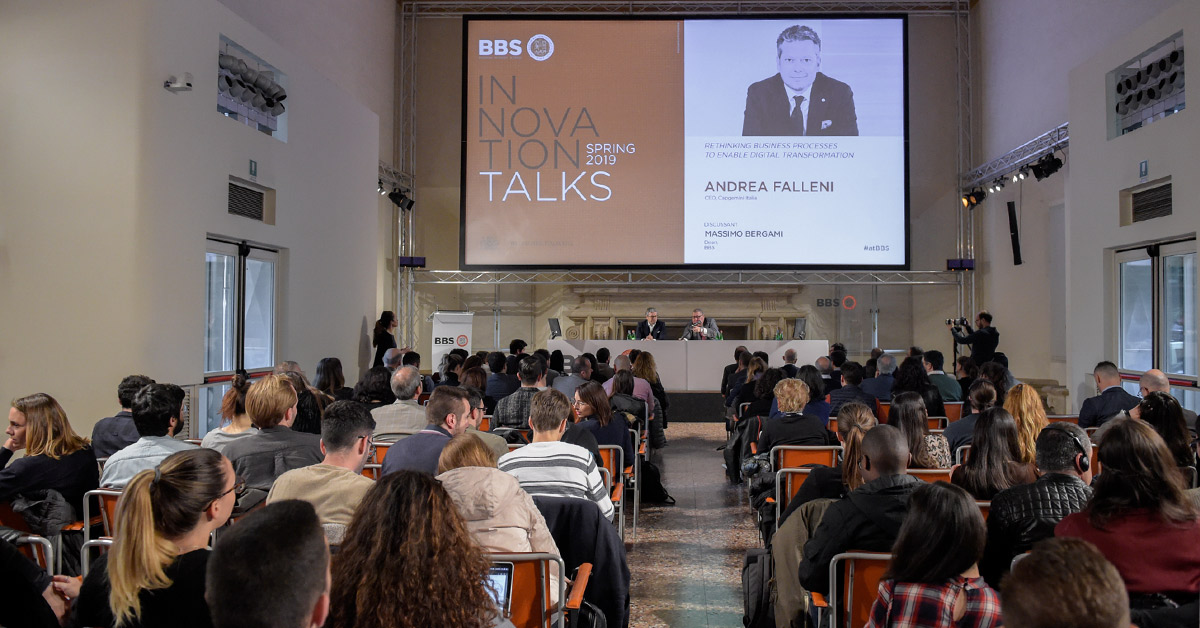
Andrea Falleni, CEO of Capgemini Italia, explains the Digital Transformation at BBS
21 May 2019Andrea Falleni, CEO of Capgemini Italia, a leading company in consulting and technology services, was a guest of the fifth Innovation Talk of the 2019 Spring Edition, bringing to the BBS Community his experience on the integration of new technologies into already consolidated business processes.
During the event, Andrea Falleni discussed about digital transformation, sharing the early stages of his career in Information Technology, which began in the 1990s, when this sector was not yet well known. Today, 30 years later, technology is at the core of every company’s strategic planning and often the goal of a Manager is precisely that of revisiting the systems through innovation. This shows the radical change of direction compared to the past, when technology was seen simply as a commodity.
To be effective, the technological revolution proposed by a company, must also involve its customers. Falleni explained how, precisely for this reason, Capgemini places people at the center of its business strategy: “We try to bring innovation to customers, to achieve the best results for them. Not for the technology itself, but for the improvement that it can trigger”.
The practical involvement of the customers in Capgemini’s processes takes place through two of its brands: Capgemini Invent and Sogeti. The first one concerns a new global business line of innovation, consulting and transformation, which with its multidisciplinary team helps entrepreneurs to find new sources of value by accelerating the process of transforming ideas into prototypes, taking advantage of the entire business experience and technology of the Group. The result is a coordinated transformation approach, which allows companies to create products, services and business models of the future. Sogeti, on the other hand, works closely with its customers at a local level, and is therefore able to reap all the advantages of technological opportunities by combining agility and speed of implementation to obtain innovative and future-oriented solutions.
To ensure that the digital transformation of a company is profitable, the participation of the entire structure and the continuous communication between the various departments is necessary. The work group must be able to keep up with innovation and be composed of people with technological and managerial skills, who can work side by side with machines equipped with Artificial Intelligence. “In order to implement digital transformation, the whole team needs to be involved. In companies, the skills needed to cope with that change must be developed. There is no rule for making the digital revolution, but there are certainly known mistakes to avoid,” said the CEO of Capgemini Italia.
“We must start from the connection to arrive at a transformation. Data is the engine of all this, and the key point is to re-imagine the business to get a different vision of the product and review the process of the product itself. Everything must focus on ideas and creativity. Innovation must be at the center of the guiding reasoning,” Falleni added.
In fact, digital transformation is not a finite process, but a continuous evolution that brings with it important challenges, both in terms of digital capabilities and leadership. The former allow the processes of company transformation to materialize, while the latter is linked to the vision of the company itself, to the knowing of how to govern the transformation process and to keep the employees focused on the process.
“Today the transformation can no longer be delegated. To do it, be it digital or of a different nature, it takes competence, and competence requires training. We need to go inside the companies and create different people, more open and proactive towards the future.”– Andrea Falleni.
